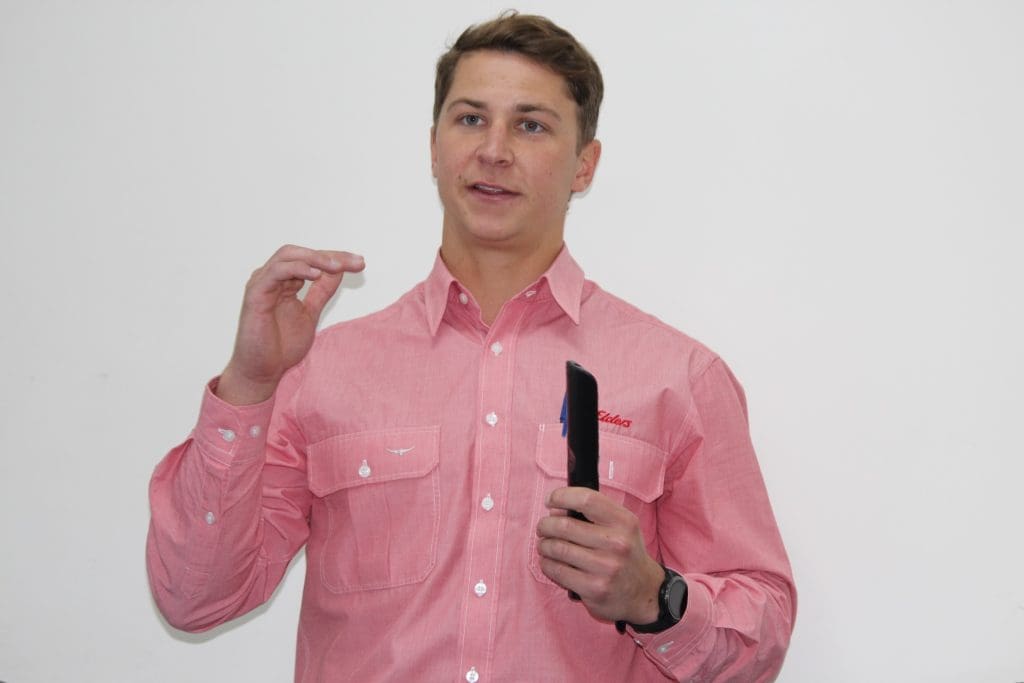
Elders commercial manager, wool, Brodie Easton.
ELDERS’ new Melbourne warehouse for its world-first automated wool handling business is nearing completion, Gippsland growers were told last month.
The company’s commercial manager, wool handling, Brodie Easton told wool growers in Melbourne the automated wool handling system will revolutionise wool handling and testing in Australia.
Twenty years on from when Elders first outsourced its wool handling through AWH, the company is completing four year’s work to establish hubs in Western Australia and Melbourne to handle its growers’ clips nationally.
Mr Easton said “practical completion” of the Melbourne hub is due this month. The launch of the automated wool handling project is scheduled for early 2023.
“The overall warehouse is all but complete.”
He said the project involves an investment of about $25m “upfront”, but in the long-term will have an overall cost of about $50m allowing for scaleability, and is an indication of Elders’ confidence in the wool industry and its growth.
Mr Easton said the Melbourne warehouse at Ravenhall just off the Ballarat Highway is almost completed. Wool bales will be able to be stacked 11 bales high and they will be moved using 22 Italian-made five-tonne driverless Autonomous Guided Vehicles (AGVs) operating using lasers. These work 24 hours a day before recharging for 90 minutes. He said the AGVs enable Elders to keep costs down by doing the “grunt work” from after coring to racking and then out for distribution.
He said the 35,000 square metre Melbourne warehouse’s roof is 16 metres high at its peak and will have the capacity to store about 60,000 bales and unload B triple trucks. It has improved safety and sustainability features, including a 350 kilowatt solar system.
“Ultimately, those AGVs run off about $1.20 a day on electricity.
“They are pretty significant machines and from a safety and sustainability aspect far outperform your standard forklift.”
Mr Easton said the warehouse is easily accessed and will not be more costly to grower clients.
“It’s not going to impact the client at all.
“The motto is ‘no client will be worse off’, your experience will only improve with this new wool handling capability,” he said.
“I think the best part of it is we are in control of it as well; if you have a bad experience then you are talking directly to Elders.
“If there are issues then it’s on us and are we ultimately responsible for that.”
Traceability from farm to shipping
Mr Easton said the new system will use software enabling 100 percent traceability from farms through 13 regional supply centres to the hubs, with each bales being allocated an ID number on induction and trackable through an app.
“We’ll know exactly where it is, how long it has been in the store, so those robots can go and select it when it’s time to go out the door.”
He said the system will enable bales to hopefully be “turned around” for sale in the next sale after receival, he said. Elders will also have all the equipment ready for the industry-wide adoption of the Australian Wool Exchange’s eBale system.
Mr Easton said nothing will change for growers on farm and wool will continue to be sold out of Melbourne, Fremantle and Sydney. Elders’ current Brooklyn show floor will be moved out to the Melbourne hub on a 4000 square metre mezzanine, giving a view of the core lines and AGVs operating on the ground floor. Buyers will assess the wool at the new warehouse before coming to the Brooklyn wool auction selling centre to bid on lots.
New coring machines will double current capacity
Mr Easton said the Melbourne warehouse will have two New Zealand-made core lines, and one in Western Australia, with each having the capacity to put through about 100 bales an hour, double the rate of current coring lines. This will mean 1600-1800 bales can be processed and stacked daily in the new Melbourne warehouse.
Mr Easton said 80 percent of Australia’s wool is exported from Melbourne and district wool manager Madi Gallagher said the new receival centre and hub system will mean that wool currently stored in other regional centres nationally would now come to Melbourne. This would mean lower transport costs for buyers of northern clips and potentially better competition for clips, she said.

The wool warehouse is the best.
Elders is at last awakening from a long sleep as an innovator. It is decades since the last major innovation, ClipCare.
Rather than chasing bright lights, it is reassuring to see Elders stick with modernizing the industry that created their wealth.
There is a lot of wealth left in wool, but it will demand wise investment at every point from ram selection to shipping for it to be realised.